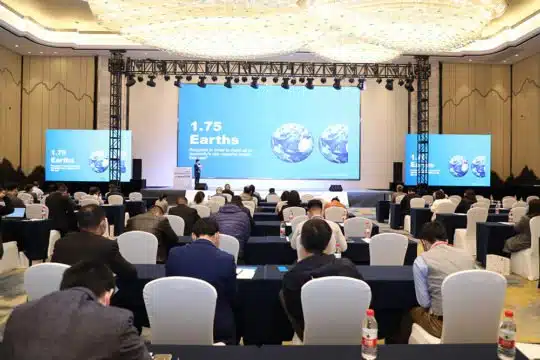Scholle IPN China Presents at Chemicals Packaging and Logistics Forum
December 15, 2021
 This year, members of Scholle IPN’s branch in Suzhou, China attended the Chemicals Packaging & Logistics Forum (CPLF 2021). This year’s CPLF brought together over 500 industry professionals to discuss innovations in packaging across the global supply chain. Along with a trade show floor with over 50 exhibitors, CPLF hosted dozens of talks about innovative new ideas, food-grade packaging, and long-term sustainability goals to work towards a carbon neutral future.
This year, members of Scholle IPN’s branch in Suzhou, China attended the Chemicals Packaging & Logistics Forum (CPLF 2021). This year’s CPLF brought together over 500 industry professionals to discuss innovations in packaging across the global supply chain. Along with a trade show floor with over 50 exhibitors, CPLF hosted dozens of talks about innovative new ideas, food-grade packaging, and long-term sustainability goals to work towards a carbon neutral future.
Scholle IPN was honored to take the stage and present our Environmental, Social, and Governance (ESG) report. “As Scholle IPN is mainly active in food and beverage applications, we wanted to expose ourselves more to more non-food industries,” says Amy Song, Scholle IPN Product Manager based in Suzhou. We discussed how flexible packaging is applicable in a number of industries and how it can address issues of food insecurity, sustainability, and long term source reduction.
In October of 2021, Chinese authorities announced a plan to reach carbon neutrality by 2060. Because our flexible packaging focuses on strategies to reduce carbon output, we were especially keen to present our company approach to sustainability. “Scholle IPN, as a flexible packaging solution provider, understands how packaging and sustainability intersect,” Song says, “and we knew we could contribute ideas on reducing resource and energy consumption, cutting back on greenhouse gas emission, and packaging materials recyclability.”
The ESG report outlines the current state of affairs when it comes to current packaging formats. It urges companies to break out of the business-as-usual mindset and consider big-picture ideas. We break down what it means to approach supply streams as a circular system versus a linear one, for example. We also discuss the importance of widespread change throughout the entire supply chain. The report steps backwards to show how Scholle IPN has crafted its products and processes around the principles of sustainability and responsible sourcing.
After taking a step backwards, the ESG report dives into specific metrics to describe how flexible packaging can help companies achieve carbon neutrality. They presented facts like how flexible packaging minimizes food waste with a +99% evacuation rate, achieves 99% cube efficiency when palletized, and leads to less post-consumer waste and reduced recycling infrastructure.
The report went on to detail innovative ideas around flexible packaging, like aseptic technology and fitment design. Aseptic technology allows companies to store their product without refrigeration, eliminating the need for cold storage. Our cutting-edge fitment design makes recycling more intuitive and drastically cuts back on materials through intelligent engineering decisions, like flip-open caps that are made of one piece and are easy to re-seal. On top of that, our fitments are ergonomically designed to make products easy to use (when appropriate) for all ages and abilities.
We also presented real-life examples of how flexible packaging has helped our partners cut back on waste across industries. From automotive lubricants to child-friendly snack lines to industrial agricultural tools and chemicals, we’ve worked with partners across the globe to provide sustainable packaging solutions, and were eager to share tangible examples of our work in action.
Attendees were receptive and excited to learn how flexible packaging can contribute to a more circular economy. “We briefed the audience on our extensive experience across various sectors and applications,” Song says. COVID-19 has severely impacted the supply chain for many businesses, and Song and her team were able to share how flexible packaging can help companies enter new markets and address common growth issues. “Given the impact of the COVID-19 pandemic, chemical brand owners in particular have been under pressure because of material shortages and cost increases. Logistics add to cost, so we hope our flexible packaging solutions can provide them with an alternative packaging solution.”
Our hope is that flexible packaging can mitigate some of these immediate supply chain concerns, but can also provide added sustainability gains that will be felt for years to come. You can learn more about our commitment to source reduction, innovation and how each one of our global locations is working to build a more sustainable future.
